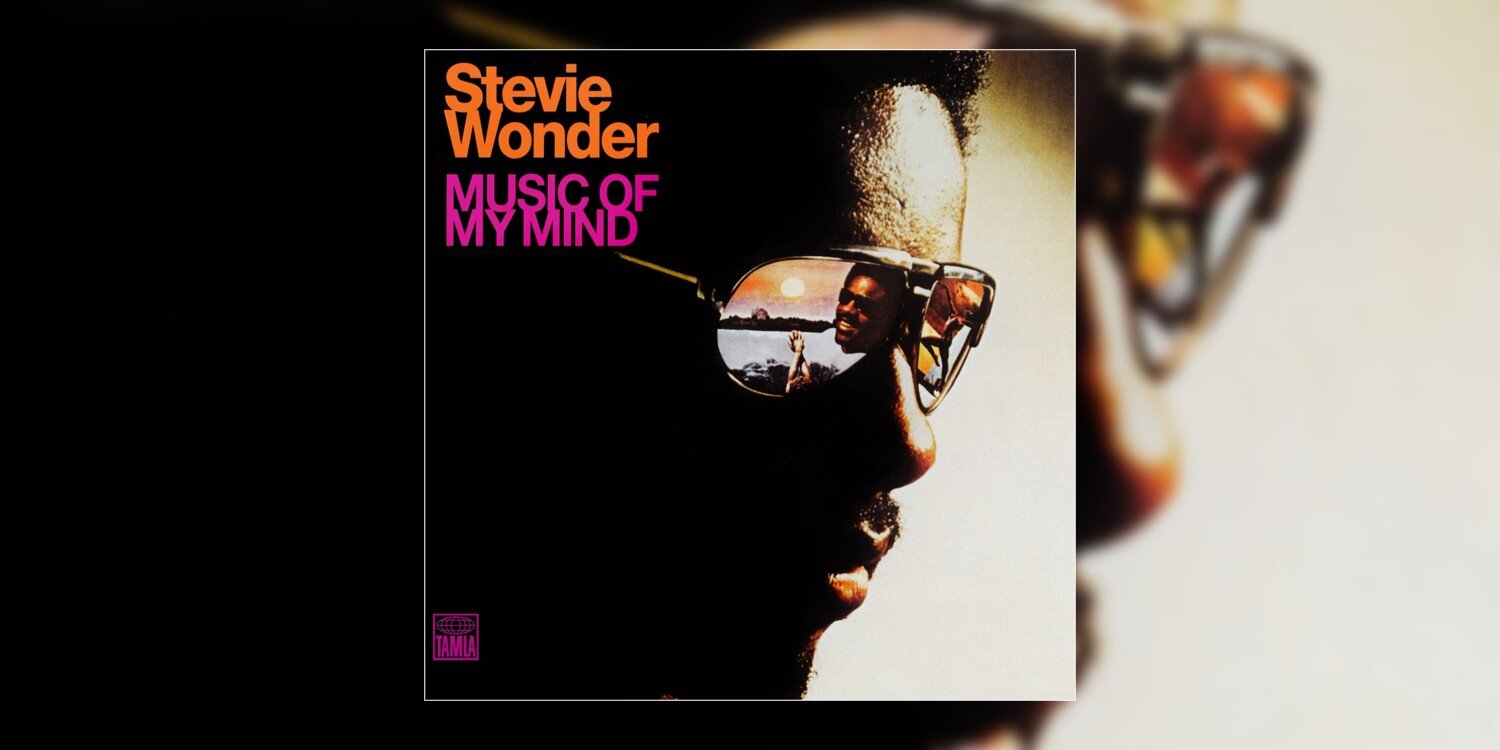Happy 45th Anniversary to Stevie Wonder’s Music of My Mind, originally released March 3, 1972.
“The best thing to come out of Motown since Marvin Gaye’s 'What’s Going On' and perhaps even more impressive as a personal achievement.” – 'Rolling Stone' (1972)
Pick any record from Stevie Wonder’s “classic period” in the 1970s (Talking Book, Innervisions, Fulfillingness’ First Finale, Songs in the Key of Life, or Journey Through the Secret Life of Plants), and one could easily prove that he’s a modern-day Mozart. However, the mythology starts with 1972’s Music of My Mind, an album that effectively transitioned him from child star to mature solo artist.
In 1961, Motown founder Berry Gordy signed the 11-year-old prodigy Stevland Hardaway Morris to a five-year contract, holding his royalties in a trust until he turned 21. Despite being one of Motown’s hitmakers that during the ‘60s—with notable hits like “Fingertips (Pt. II),” “My Cherie Amour,” and “Signed, Sealed, Delivered I’m Yours,” among others—“Little Stevie Wonder” was failing to reach the commercial heights of his peers. So, when it came time for Stevie (now 21 years old and married to Syreeta Wright) to request total control of his music in 1971, Gordy refused.
Adding to Wonder’s frustration was the desire to spread his artistic wings beyond the “assembly line” of radio-friendly staples. Gordy eventually honored Wonder’s request after he opted out of his existing contract and began producing his next album independently. Working closely with studio wizards Bob Margouleff and Malcolm Cecil, Music of My Mind is widely regarded as the moment the singer-songwriter came of age, both legally and artistically.
The gnarled funk/rock of “Love Having You Around” is a fitting opener and transition point in Stevie Wonder’s career. Gone is the two-and-a-half-minute, radio-friendly, Hitsville USA staple. In its place is an emotionally rich song with prominent synth-keyboards, electronically distorted vocals, and tongue-in-cheek lyrics (“Every day, I want to get on my camel and ride”).
“Superwoman (Where Were You When I Needed You)” is the quintessential Stevie Wonder jam that pushes compositional boundaries and provides a template for his ‘70s masterpieces. Floating above a lush bed of bubbling chords and jazz-inflected guitar riffs, Wonder ridicules a woman named Mary—when, in truth, it was his wife Syreeta—for cutting him out of her life to pursue stardom, taunting “Does she really think she will get by with a dream?” He also notes when summer was here “you were not around,” and when winter came “you went further south.” His conclusion: “Our love is at an end.” Despite its bittersweet tone, “Superwoman” was the album’s biggest single, reaching No. 13 and No. 33 on the Billboard R&B and pop charts, respectively.
While “Superwoman” may have showcased a different, less cheerful version of Wonder, many of the songs (“I Love Every Little Thing About You,” “Happier Than the Morning Sun,” “Girl Blue,” and “Keep on Running”) radiate the importance of sharing and receiving love across various soundscapes. Nevertheless, Stevie’s vulnerability is just as authentic as his carefree pop recordings of yesteryear.
He pulls in close for the touching ballad “Seems So Long,” in which a new woman encourages him to move forward despite the pain of heartbreak. “Lady love and lady cared / but lady went away / and left me all alone to suffer / And now I feel it’s not fair / for me to fall in love / The truth is the real me you must uncover.” These feelings, no doubt, are valid from Stevie’s perspective, considering his marriage with Syreeta fizzled out as described in “Superwoman,” but he wrings the song for its worth at the end, realizing that he can’t wallow in his past. “Now I think I’ve found someone to make me trust in someone again,” he cries. “I believe that I can trust in you!”
Coming full circle is the gospel-tinged closer “Evil,” where he humanizes evil to decry it for having “taken over God’s children’s eyes” and leaving love “an outcast of the world.” Unlike some artists dealing with social and political issues today, his concern isn’t expressed in rage and violence, but rather in a desire for peace and harmony.
Stevie Wonder might not exactly have hit the ground running in harsh commercial terms, but creatively the signs were there from the start. Music of My Mind managed to claw its way as high as No. 6 and No. 21 on Billboard’s R&B and pop charts, respectively, chalking up sales north of 500,000. Best of all, Stevie Wonder sounds as if he’s really having fun, which is all we could hope for, considering the joy he’d give us for generations. His arc from beloved child star to his adult years as a dazzling musical titan has certainly made its mark on countless artists from different generations.
Fighting for complete control of one’s music and pioneering use of electronics? See Prince. Smooth and soulful multi-tracked vocals? See Michael Jackson and Usher. Timeless songwriting that’s confident and expressive? See Erykah Badu, Lauryn Hill, and Janelle Monáe.
LISTEN:

